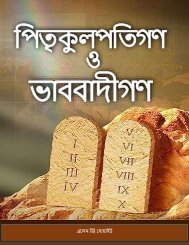Finishing the Race
Of all the games instituted among the Greeks and the Romans, the races were the most ancient and the most highly esteemed … The contests were governed by strict regulations, from which there was no appeal. Those who desired their names entered as competitors for the prize had first to undergo a severe preparatory training. Harmful indulgence of appetite, or any other gratification that would lower mental or physical vigour, was strictly forbidden. For one to have any hope of success in these trials of strength and speed, the muscles must be strong and supple, and the nerves well under control. Every movement must be certain, every step swift and unswerving; the physical powers must reach the highest mark.
Of all the games instituted among the Greeks and the Romans, the races were the most ancient and the most highly esteemed … The contests were governed by strict regulations, from which there was no appeal. Those who desired their names entered as competitors for the prize had first to undergo a severe preparatory training. Harmful indulgence of appetite, or any other gratification that would lower mental or physical vigour, was strictly forbidden. For one to have any hope of success in these trials of strength and speed, the muscles must be strong and supple, and the nerves well under control. Every movement must be certain, every step swift and unswerving; the physical powers must reach the highest mark.
You also want an ePaper? Increase the reach of your titles
YUMPU automatically turns print PDFs into web optimized ePapers that Google loves.
Though <strong>the</strong> night of sorrow ga<strong>the</strong>red dark about <strong>the</strong>se followers of Jesus, yet were <strong>the</strong>y<br />
not forsaken. Saith <strong>the</strong> prophet: "When I sit in darkness, <strong>the</strong> Lord shall be a light unto me. . .<br />
. He will bring me forth to <strong>the</strong> light, and I shall behold His righteousness." "Yea, <strong>the</strong><br />
darkness hideth not from Thee; but <strong>the</strong> night shineth as <strong>the</strong> day: <strong>the</strong> darkness and <strong>the</strong> light<br />
are both alike to Thee." God hath spoken: "Unto <strong>the</strong> upright <strong>the</strong>re ariseth light in <strong>the</strong><br />
darkness." "I will bring <strong>the</strong> blind by a way that <strong>the</strong>y knew not; I will lead <strong>the</strong>m in paths that<br />
<strong>the</strong>y have not known: I will make darkness light before <strong>the</strong>m, and crooked things straight.<br />
These things will I do unto <strong>the</strong>m, and not forsake <strong>the</strong>m." Micah 7:8, 9; Psalms 139:12;<br />
112:4; Isaiah 42:16.<br />
The announcement which had been made by <strong>the</strong> disciples in <strong>the</strong> name of <strong>the</strong> Lord was in<br />
every particular correct, and <strong>the</strong> events to which it pointed were even <strong>the</strong>n taking place.<br />
"The time is fulfilled, <strong>the</strong> kingdom of God is at hand," had been <strong>the</strong>ir message. At <strong>the</strong><br />
expiration of "<strong>the</strong> time"--<strong>the</strong> sixty-nine weeks of Daniel 9, which were to extend to <strong>the</strong><br />
Messiah, "<strong>the</strong> Anointed One"--Christ had received <strong>the</strong> anointing of <strong>the</strong> Spirit after His<br />
baptism by John in Jordan. And <strong>the</strong> "kingdom of God" which <strong>the</strong>y had declared to be at<br />
hand was established by <strong>the</strong> death of Christ. This kingdom was not, as <strong>the</strong>y had been taught<br />
to believe, an earthly empire. Nor was it that future, immortal kingdom which shall be set up<br />
when "<strong>the</strong> kingdom and dominion, and <strong>the</strong> greatness of <strong>the</strong> kingdom under <strong>the</strong> whole<br />
heaven, shall be given to <strong>the</strong> people of <strong>the</strong> saints of <strong>the</strong> Most High;" that everlasting<br />
kingdom, in which "all dominions shall serve and obey Him." Daniel 7:27.<br />
As used in <strong>the</strong> Bible, <strong>the</strong> expression "kingdom of God" is employed to designate both <strong>the</strong><br />
kingdom of grace and <strong>the</strong> kingdom of glory. The kingdom of grace is brought to view by<br />
Paul in <strong>the</strong> Epistle to <strong>the</strong> Hebrews. After pointing to Christ, <strong>the</strong> compassionate intercessor<br />
who is "touched with <strong>the</strong> feeling of our infirmities," <strong>the</strong> apostle says: "Let us <strong>the</strong>refore come<br />
boldly unto <strong>the</strong> throne of grace, that we may obtain mercy, and find grace." Hebrews 4:15,<br />
16. The throne of grace represents <strong>the</strong> kingdom of grace; for <strong>the</strong> existence of a throne<br />
implies <strong>the</strong> existence of a kingdom. In many of His parables Christ uses <strong>the</strong> expression "<strong>the</strong><br />
kingdom of heaven" to designate <strong>the</strong> work of divine grace upon <strong>the</strong> hearts of men.<br />
So <strong>the</strong> throne of glory represents <strong>the</strong> kingdom of glory; and this kingdom is referred to in<br />
<strong>the</strong> Saviour's words: "When <strong>the</strong> Son of man shall come in His glory, and all <strong>the</strong> holy angels<br />
with Him, <strong>the</strong>n shall He sit upon <strong>the</strong> throne of His glory: and before Him shall be ga<strong>the</strong>red<br />
all nations." Mat<strong>the</strong>w 25:31, 32. This kingdom is yet future. It is not to be set up until <strong>the</strong><br />
second advent of Christ. The kingdom of grace was instituted immediately after <strong>the</strong> fall of<br />
man, when a plan was devised for <strong>the</strong> redemption of <strong>the</strong> guilty race. It <strong>the</strong>n existed in <strong>the</strong><br />
purpose and by <strong>the</strong> promise of God; and through faith, men could become its subjects. Yet it<br />
was not actually established until <strong>the</strong> death of<br />
Christ. Even after entering upon His earthly mission, <strong>the</strong> Saviour, wearied with <strong>the</strong><br />
stubbornness and ingratitude of men, might have drawn back from <strong>the</strong> sacrifice of Calvary.<br />
In Gethsemane <strong>the</strong> cup of woe trembled in His hand. He might even <strong>the</strong>n have wiped <strong>the</strong><br />
215


















